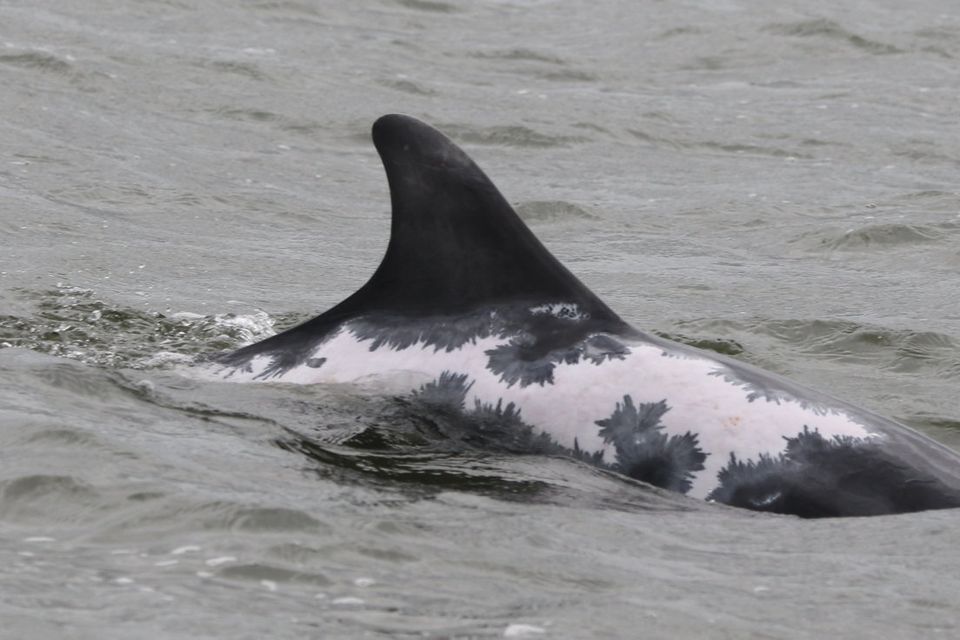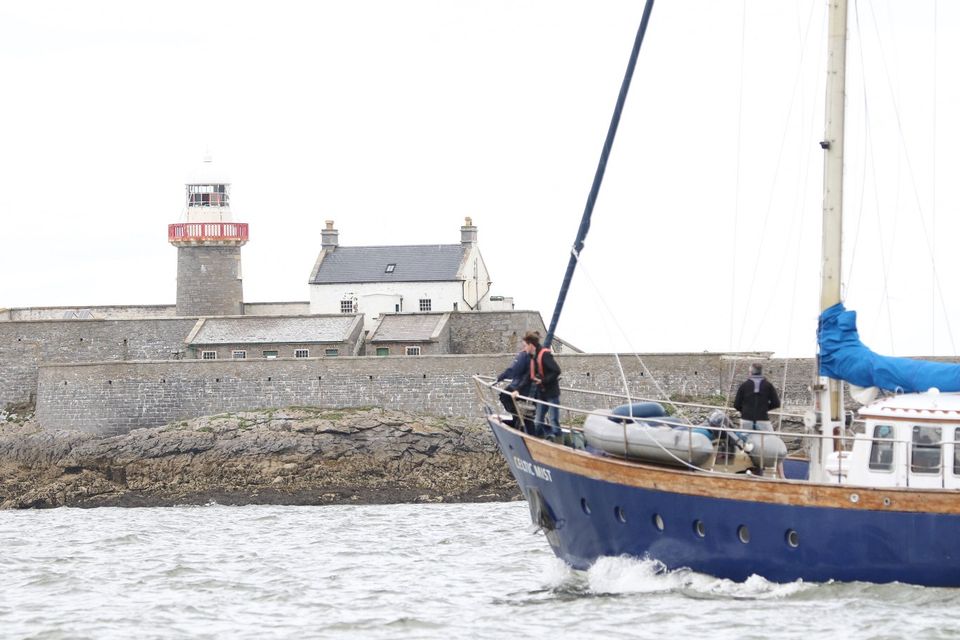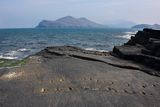Move over Fungi - famous sunburnt Scottish dolphin feared dead is now making waves on Kerry coast
After suffering severe sunburn following stranding, 'Spirtle' wasn't given much chance of survival
Spirtle's unique skin discolouration seen off the coast of Kerry. Photo: Simon Berrow/IWDG
A SCOTTISH dolphin that was feared dead after suffering severe sunburn has been spotted in her new home off the coast of Ireland.
Fungi may have some competition as the most notorious dolphin in Kerry waters, as sightings of Scottish dolphin Spirtle suggest that the bottlenose may have settled in Ireland's south-west.
After washing up on Aberdeen's shoreline in 2016, Spirtle was given little chance of survival. Her recovery was monitored closely for two years, but she had not been seen since September 2018.
Sightings off Wicklow in May confirmed that the famous dolphin was still alive, and after a period of eluding experts, recent sightings of Spirtle in Fenit, Co Kerry, reveal that she may remarkably be planning to stay, according to the Irish Whale and Dolphin Group (IWDG).
"We thought, it can't be, but there were pictures sent in and it was Spirtle," IWDG CEO, Simon Berrow said of learning that the bottlenose was still in Ireland.
"Will these dolphins take a residence in Fenit? Will they join the Shannon dolphin population, which interestingly enough, are genetically different, which would imply that they don't breed with each other. It's a generally discreet area, it's not like they're roaming a huge area. It's a tiny little area.
"We just managed to establish that she is part of a Scottish group. A small group with five or six dolphins, and one of the group is actually her mother. There is a juvenile too which could be Spirtle's sister or brother."
According to Mr Berrow, even surviving her stranding was a miracle for Spirtle, her right side having been left red-raw after baking in the heat on mudflats in the Cromarty Firth, Moray.
She was first seen off Fenit on July 7 when Dr Joanne O’Brien, an officer with the IWDG, identified her.
The advanced photo identification methods used by whale and dolphin groups were not necessary to track Spirtle, after her severe sunburn left her with a unique black and white right flank.
"You wouldn't have given that dolphin any chance whatsoever," Mr Berrow said.
"It was unbelievable. Lost stranded dolphins and porpoises generally do die. We make an assessment, you don't just refloat every animal that strands because they might be in poor condition they might not be a candidate for refloating.
Irish Whale and Dolphin Group research vessel, the Celtic Mist. Photo: Simon Berrow/IWDG
"A good candidate for refloating would be an offshore species, which typically doesn't live near the coast and looks in good condition and doesn't have anything obvious damage to it, or wound. Spirlte was none of that.
"If you refloat an animal which is dying and is injured and is in poor condition, you're just torturing it, so sometimes the best option is to let it die or get a vet down to euthanise it. If a bottlenose dolphin strands, you wouldn't give it much chance because they are coastal species so why would they strand unless the were ill or diseased?
"With severe sunburn like that, on a young animal, you wouldn't give it any chance at all."
According to Mr Berrow, Spirlte's story shows why "you should always give someone a chance." r.
While Spirtle will hopefully remain on Ireland's south-west, she is unlikely to form a celebrity couple with one of our resident famous dolphins because of the human contact they have received dulling some of their natural instincts.
"If they get well fed, that's a reason to stay in an area. Unless they are driven away, because dolphins are very territorial, they might stay," he said.
"Fungi is an old man at this stage and he's passed anything at this stage. But it's not unusual for Fungi or Dusty up in North Clare to come into contact with other dolphins.
"It's interesting why they stay as solitary dolphins. Fungi is completely institutionalised. They are not normal. Their behaviour is completely not normal, because, to be honest they've been ruined by humans."
Spirtle seen with her small pod of Scottish bottlenose dolphins off the coast of Kerry Photo: Simon Berrow/IWDG
Join the Irish Independent WhatsApp channel
Stay up to date with all the latest news

















